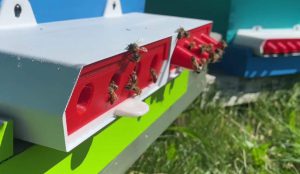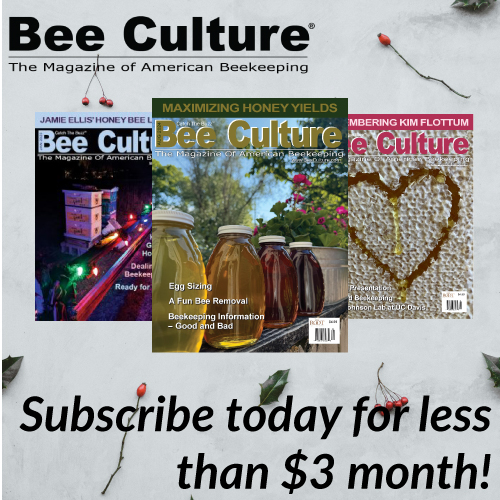Bees can now get their hives renovated — and it could save their lives
ProtectaBEE won a silver medal from the World Beekeeping Awards last month
Kate Bueckert · CBC News ·

ProtectaBEE is a new beehive entrance that can help protect honeybees from pests and disease. It recently won silver from the World Beekeeping Awards at the 48th Apimondia International Apicultural Congress in Chile in September. It was created by Best For Bees and researchers at the University of Guelph. Best For Bees founder Erica Shelley talks about the invention and how it works.
A new device created by Ontario researchers is like adding a new, safe front porch to honeybee hives.
ProtectaBEE is a honeybee hive entrance that can help protect the pollinators from pests and diseases.
In recent years, beekeepers across the country have faced a number of challenges when it comes to maintaining their bee hives, including changing climate and parasites and in particular varroa mites. The mites feed on honeybees and can spread viruses in hives.
This past spring, beekeepers across the country reported large colony losses. Rod Scarlett, executive director of the Canadian Honey Council, told CBC News in April Alberta, Manitoba and Ontario honey producers lost an average of 40 to 45 per cent of their bees earlier this year while losses were as high as 60 per cent in Quebec.
It’s a problem Erica Shelley wanted to address, She’s the founder of Best For Bees, a research and development company for beekeepers based in Kitchener. She collaborated with University of Guelph researcher Peter Kevan on ProtectaBEE.
The ProtectaBEE device is red and has nozzles for the entrance and exit to the hive.
The hive entrance was first created for bee vectoring — a process developed by Kevan and other Guelph researchers where bees walk through a biocontrol powder, which they shake off onto crops while getting pollen. The biocontrol powder protects crops and deals with the parasitic varroa mite.
“That’s still in development, it’s a few years out,” Shelley said.
But in testing the product, Shelley said she found other benefits.
“The red colour actually is not easily seen by other insects,” she said.
“It actually is a protection against wasps and hornets and yellow jackets and even robbing bees from other hives,” Shelley said, adding it also protects against skunks and mice.
Silver medal at global conference
ProtectaBEE has now been recognized on a world stage. The device won a silver medal from the World Beekeeping Awards, which were handed out at the Apimondia International Apicultural Congress in Chile last month.
Shelley says there were about 20 entries from developers and inventors from around the world, large machines down to smaller innovative ideas.
“To have the world’s experts look at your thing that you’ve invented and they’ve seen so many inventions come through over the years and then to award a medal to it, it was just that kind of honour,” she said.

Erica Shelley is the founder of Best for Bees, based in Kitchener. She worked with University of Guelph researcher Peter Kevan to develop ProtectaBEE, a hive entrance for honeybees. She’s wearing the silver medal ProtectaBEE won at the World Beekeeping Awards in September. (Kate Bueckert/CBC)
“It also means we’re on the right track and what we’re working on is something that has meaning and is obviously worthwhile.”
Enid Brown, a director with the World Bee Awards, explained the judges for the awards are all practical beekeepers and they “study all the exhibits and look to see how practical they are and if the invention would be suitable to use.”
“They are aware of other products on the market and take into consideration whether this is a true invention or something that has been altered,” Brown told CBC News in an email.
Kevan says Shelley took his previous research and built upon it to create ProtectaBEE and he says it’s a smart invention because it’s simple and quick to use.
Now, the goal will be to get more people to use it, he said.
“It certainly would be useful, I think, to the commercial side of beekeeping, honey production and honey bee protection,” he told CBC News. “It’s got to be accepted by the industry and used by the industry of course and will catch on.”
Kevan said he’d also encourage government agencies and commercial agricultural producers not to overlook ProtectaBEE as a viable way to maintain healthy bees. He says it’s been his experience that these groups have not really recognized Canadian-led research into bee health, even though he believes they’re a leader in the area.
“It’s been very much sort of a ho hum response from government funding agencies and the ho hum response from the bigger established commercial entities,” he said.
Bee data project
While at the conference, Shelley and Best For Bees also launched a Big Bee data movement. She says she hopes it’s a way to collect data from beekeepers around the world to watch for trends.
“It might be pollution, it might be diversity, it might be pests, it might be forage that’s available and that, with using machine-learning, we can actually answer these big questions quickly,” Shelley said.
“So we’re trying to have this movement … so that beekeepers can help beekeepers to solve the world’s bee crisis.”
Shelley says it’s very personal for her to protect bees.
“Bees are very important for our environment and also our food security,” she said. “Our ability to eat good food goes hand-in-hand with their survival.”
We are here to share current happenings in the bee industry. Bee Culture gathers and shares articles published by outside sources. For more information about this specific article, please visit the original publish source: Bees can now get their hives renovated — and it could save their lives | CBC News






